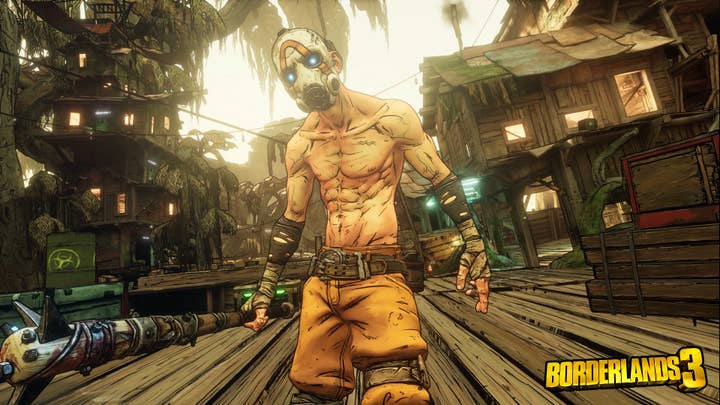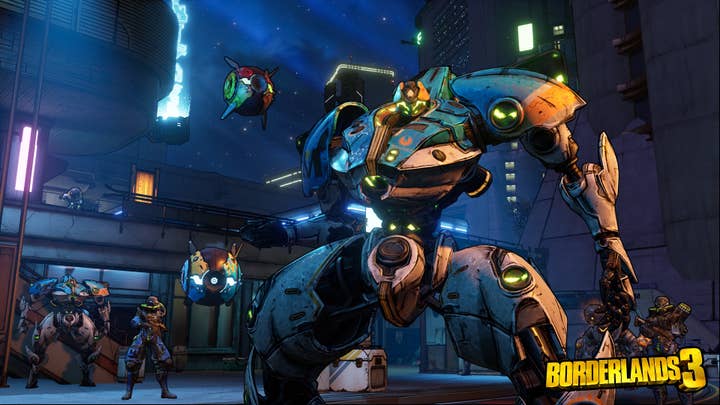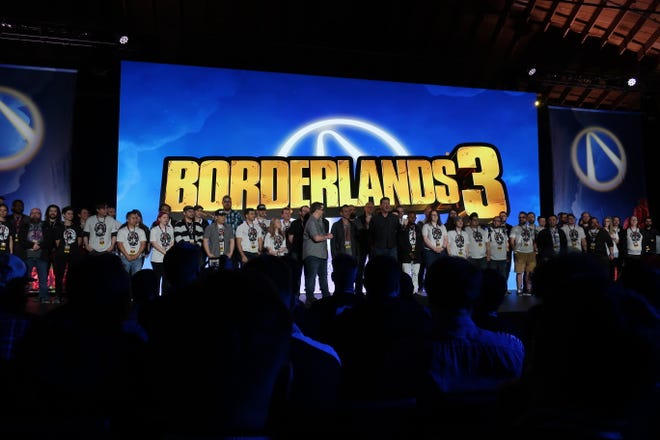Borderlands 3 is about more bullets, not new bullet points
Gearbox developers say the latest entry was about broadening the familiar, share thoughts on collaboration, crassness, and crunch
Above the bridge on the Sanctuary III spaceship, a brightly lit yet crudely scrawled sign reads, "Welcome Home" in a move that both aesthetically and tonally highlights a major theme of Borderlands 3: comfortable familiarity.
At the Borderlands 3 gameplay reveal event yesterday, GamesIndustry.biz spoke with three members of the Borderlands 3 team: lead enemy designer Josh Jeffcoat, and producers Anthony Nicholson and Chris Brock. Throughout our conversations, one point often repeated is that Borderlands 3 is not a drastic departure from previous games. All three developers say that in creating the latest entry, the team spent a lot of time looking back at the staples of the series and expanding on those, rather than trying to do something dramatically new or innovative.
"We know what we're good at and what people love about Borderlands," Nicholson says. "We already had a strong foundation, so it was more about finding the things we know people really cling to and we know we do well, and expanding on those things. It was all more about us taking a look in the mirror, looking at what we know is good from what we've done before that's been proven to be good, and making that better."
"We want to make sure we're true to our foundation," Brock agrees. "We want to make sure that what has been successful in past Borderlands games, we're able to do that in Borderlands 3 also. It's a challenge. We're always looking back at our former selves and asking, 'How did we do this here? Should we change how we do that, or should we build on the thing we have that we know is successful?'"
"It would be easy to say that we need a big bullet point, a new 'something' for Borderlands 3, but the thing we're doing is breadth"
Chris Brock
That commitment to stick with the familiar holds true in spite of a seven-year gap between Borderlands 2 and 3 in which a number of conceptually similar games have sprung up. As Brock puts it, "the genre happened" between the two numbered entries, but he and Jeffcoat both emphasized that the Borderlands games' focus on storytelling continues to set them apart despite the boom of looter shooters.
"The longer you wait, the more you build up an expectation," says Brock. "It's been interesting to watch Destiny and The Division and interesting to see what the other people in the genre are doing, and we look at that stuff and see what we can learn from it, but I think there are a lot of things that we are best in class at.
"It would be easy to say that we need a big bullet point, a new 'something' for Borderlands 3, but the thing we're doing is breadth. We're doing the thing we do as best as we can do it. There's a gulf right now: the kind of thing we're really good at making isn't out there, so we're doing that."

Jeffcoat says, "We looked at a lot of other games and lost a lot of sleep playing a lot of other games. But one of the things that's always made us strongest is that we've always been heavily focused on story and characters. That dictated the ways the game could even work. If you were going to do an open-world shooter where people are constantly coming and going, it's really hard to tell a really strong narrative there. We decided early on that we were going to tell a campaign story and have a big, long journey through it, and that still makes us pretty unique today."
Another departure Borderlands 3 is taking from other large looter shooter games is its avoidance of loot boxes. On stage at the reveal event, Gearbox CEO Randy Pitchford declared that Borderlands 3 would have "no microtransactions," though in conversations with developers that turned out not to be accurate. The specifics of the model have yet to be revealed, but Borderlands 3 will include cosmetic items that can be purchased with real money. However, Nicholson says Gearbox is "not interested in anything that's going to come off as a cliche pay-to-win thing."
Brock adds, "When we say 'no microtransactions,' what we're really trying to say is that we're not trying to nickel and dime people. We'll probably make content after launch that we will sell, but we also don't intend to take what Borderlands was and then chop it up into chunks and sell it."
"When we say 'no microtransactions,' what we're really trying to say is that we're not trying to nickel and dime people"
Chris Brock
Aside from a heavy focus on narrative and avoidance of specific payment models, sticking to the familiar with a new series entry like Borderlands 3 meant increasing the game's breadth rather than its depth, according to Jeffcoat. He says that meant obvious step-ups like improving character variety and skill trees, as well as Borderlands 3's boast of "over one billion guns." But that also meant a major step up in scale, as this is the first game in the series that takes the player away from the Pandora system and to other planets, such as the metropolitan Promethea. That, he continues, was a huge challenge for his team especially, as they had to conceive not just of new enemies, but enemies that were both differentiated from Pandora's traditional fare, yet still very Borderlands in style.
"We had to design completely different ecosystems and enemies for every single planet," he says. "We had to make something new, we couldn't just bring something over. Just trying to come to grips with the scope and how we were going to be able to build everything in time was an incredible obstacle to overcome.
"And the number of bosses in the game and those really big set piece moments [where the bosses are introduced] is much more than in any other Borderlands game. Just an absurd number. It was so big that my department built a brand new department only for those mega-moment bosses. My friend Matt Cox runs the boss team, and his only job is that every huge, major boss fight in the game goes through him. That's how we solved that problem - we got more people and piled onto it."
"We've done Pandora over three games," Brock adds. "We wanted to do new things and push things in a different direction environmentally, and that meant we needed to go to new planets. Pushing into those new planets created a need for more art, more flora and fauna, and more environmental storytelling. It can't be all Pandora stuff, that doesn't make sense. Establishing all this world building for lots of worlds has been probably the biggest struggle."
"[To accomplish that,] we had to change the way we worked. We had to become scalable. We had to work across teams."

Borderlands 3 is being made by around 350 people across the studio's Frisco and Quebec offices, with development really getting into full swing after Battleborn was released in 2016, according to Jeffcoat. He and the other developers say that Borderlands 3 has seen more cross-team collaboration than any of the previous Borderlands games, especially on complex areas like the bustling, futuristic city areas of the Meridian Metroplex on Promethea, and the aforementioned Sanctuary III spaceship.
Jeffcoat also says that this type of collaboration allowed for individual developers across teams to see ideas for environmental set pieces, enemies, or story beats become realities, with the studio's collaborative structure allowing for lots of personal touches. One example is that of Mouthpiece, the speaker of a Pandoran cult called the Children of the Vault, whose attacks are sound-based. His arena, weapons, abilities, and design all involved heavy collaboration with the game's audio team, resulting in unique details like the visible audio bars on Mouthpiece's shield syncing with his speech.
"Whatever weird idea you have, there's someplace you can sink it into a corner of the game somewhere"
Josh Jeffcoat
"If we have a cool idea for a weird quirk or a special enemy we want to do, sometimes we'll just make it, and set it over on the side. And eventually, we'll go work with the level designers or story guys. 'Hey, I have this one guy, and he does this weird thing, do you have a place where that fits?' Then we'll talk, we'll make sure he has a cool name that makes sense, and we'll work together to tie him into his area and tell a small story about him. It's a lot of fun, but it's some of the most time-consuming stuff when you have all these departments come together to make something sing.
"I spent a very long time working on Brothers in Arms, which is historical, real, and very reverent. And you get really burned out on that after a while. So in Borderlands 2, when I finally got to join that team officially, it was a breath of fresh air because I could do anything. The rules were, 'If it runs, you can probably put it in the game.' So whatever weird idea you have, there's someplace you can sink it into a corner of the game somewhere. And with the size of the team as it is now, that's a lot of people putting a lot of personal touches everywhere."
Jeffcoat and the others mention "weird quirks," which although vague, is nonetheless somewhat of a calling card for the Borderlands series. The games are known for frequently bizarre, pun-filled, tongue-in-cheek, self-effacing, and crass humor, something Brock says the team is going all-in on for the third game.
"Some of the stuff you saw today [during the reveal] was cool six months ago, but we looked at it and said, 'That's not Borderlands enough. Throw a big skull made of pistols on it.' There's got to be a veneer of, well, we say 'badass' too much, but it's definitely our tone."
However, in the past, that crass style has gotten the games in trouble. The first two Borderlands games had a class of enemies referred to by the pejorative "Midget," that has been replaced in Borderlands 3 with "Tink." Brock says the team is aware of the shifts in cultural views on certain topics in the ten years since the first Borderlands game and tries to be aware of the wider implications of certain ideas while still maintaining the series' edginess.
"The first game was ten years ago," he says. "It's been a big ten years; it's been a good ten years, I would say. We have to make sure we're still irreverent and still have our tone, so we need to be some kind of playful and we need to not be too careful. We're not afraid to offend somebody, but we don't want to be offensive."

Nicholson adds that the team relies on community response to help check themselves on content that might be perceived as offensive.
"We care about what the community says about the things they like and don't like, so we take that any time we design something or go to the whiteboard," he says. "The community speaking up and helping us understand what they feel is acceptable and is not acceptable is something we listen to."
Recently, a number of AAA titles have come under scrutiny for crunch culture, both to get a major title completed by a deadline and to continue supporting a successful game with regular updates.
"If we [crunched], I probably wouldn't be able to work here"
Anthony Nicholson
Nicholson and Brock both say that at Gearbox, there is no mandated crunch, although some employees do choose to work longer hours of their own volition to meet deadlines.
"One of the awesome things about our culture is that we have the freedom to go in and make the hours that we feel we need to," Nicholson says. "We don't force crunch on anybody. We have a task, we understand where it needs to be, and we work together as a team to accomplish that goal. A lot of the people that you see out on the floor are the people who make the actual maps and characters that people are seeing today.
"It helps, especially with people like me who have a wife and kids. If we [crunched], I probably wouldn't be able to work here. And you feel much more empowered to do your best when you're trying to accomplish a task."
Brock adds, "We don't have a culture of crunch. To say we never work more hours would not be true, we are still a deadline-based job and any time you have finite time you're going to have people who work extra because they want to make it. But we do not have a culture of crunch, we do not drive people into the ground. I would rather be late than kill my team."
Disclosure: 2K Games paid for our travel and accommodations for the event.
